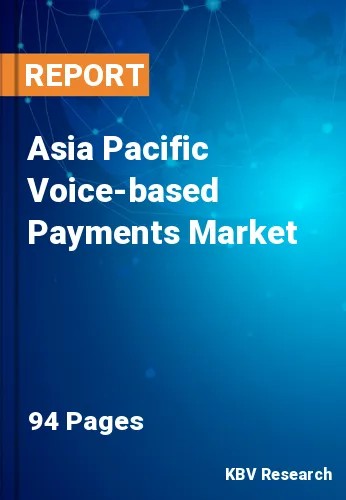The Asia Pacific Voice-based Payments Market would witness market growth of 12.4% CAGR during the forecast period (2022-2028).
The success of voice payments will be determined in large part by the hardware that supports it. Voice control technology has previously been implemented in products ranging from alarm clocks to washing machines. Customers could verbally tell their refrigerator to fill up on supermarket staples or direct their washing machine to buy their favorite detergent as these devices become capable of processing financial transactions.
Voice assistants made their mainstream debut in early 2011. The voice revolution began with IBM's Watson winning the television quiz program Jeopardy! followed by Apple's launch of Siri. Few could have guessed how popular chatting to an inanimate object would become at the time. Voice assistants are now found in a wide range of gadgets. Voice assistants are defined as AI-powered technology that accepts and responds to user requests and questions using natural language processing. Almost every new type of product today has some form of speech capabilities, from smartphones to smart speakers, showerheads, light bulbs, watches, autos, and household appliances.
The Digital India program is the government of India's flagship initiative, with the goal of transforming India into a digitally enabled society and knowledge economy. One of Digital India's stated goals is to be "faceless, paperless, and cashless." The Government of India has made digital payment promotion a top priority in order to bring every segment of the country into the formal fold of digital payment services. The vision is to deliver seamless digital payment services to all Indian people in a way that is accessible, easy, affordable, quick, and secure. With the implementation of Unified Payments Interface (UPI), digital payments in the nation became a norm. The rise of payment apps such as PayTM, Google Pay, PhonePe, etc., made the digital economy a burgeoning reality. The rise of the digital payments sector in the region has prepared a solid base for the adoption of voice-based payments systems in the upcoming years. India has also seen the growth of many online delivery companies like Swiggy, Zepto, etc., making it an ideal scenario for the proliferation of voice-based payments in the near future.
The China market dominated the Asia Pacific Voice-based Payments Market by Country in 2021, and would continue to be a dominant market till 2028; thereby, achieving a market value of $999.6 Million by 2028. The Japan market is anticipated to grow at a CAGR of 11.8% during (2022 - 2028). Additionally, The India market would showcase a CAGR of 13.1% during (2022 - 2028).
Based on Component, the market is segmented into Software and Hardware. Based on Organization Size, the market is segmented into Large Enterprises and Small & Medium Enterprises. Based on End-use, the market is segmented into BFSI, Retail, Automotive, Government & Defense, Healthcare & Life Sciences, and Others. Based on countries, the market is segmented into China, Japan, India, South Korea, Singapore, Malaysia, and Rest of Asia Pacific.
Free Valuable Insights: The Worldwide Voice-based Payments Market is Projected to reach USD 12.2 Billion by 2028, at a CAGR of 11.6%
The market research report covers the analysis of key stake holders of the market. Key companies profiled in the report include Google LLC, Amazon.com, Inc., Alibaba Group Holding Limited, Huawei Technologies Co., Ltd. (Huawei Investment & Holding Co., Ltd.), Cerence, Inc., PCI Pal PLC, Paysafe Limited, NCR Corporation, PayPal Holdings, Inc., and Vibe Group (Vibe Pay Limited)
By Component
By Organization Size
By End-use
By Country
Our team of dedicated experts can provide you with attractive expansion opportunities for your business.

